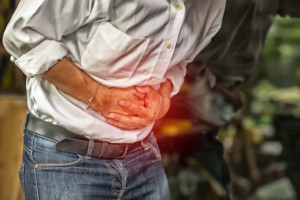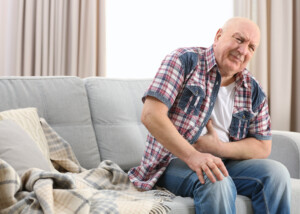Are you trickling stool or a tiny bit of “diarrhea” but also feel constipated? You’re probably not imagining this.
“Overflow incontinence” may result, in which you feel something leaking from your anus while you’re out and about.
Once in the bathroom you discover it looks like a tiny run of diarrhea or liquid stool. Yet at the same time, you feel a bowel movement that doesn’t come.
Or, when it comes, it’s in the form of very hard, ball-shaped poops that weren’t easy to void.
If you sense that something isn’t working right, you’re likely to be correct. Something is going on.
“The muscular activity that sends a wave of contraction, propelling material through the bowel, is called gastrointestinal motility,” begins Joseph Weiss, MD, a board certified gastroenterologist and clinical professor of medicine at the Medical School, University of California, San Diego.
Dr. Weiss continues, “It’s further defined as peristalsis in the small intestine, and mass movements in the colon.”
Normally, the process involves water extraction from the fecal material passing through the gut. Not enough water extraction results in diarrhea.
But what about too much water extraction?
“The electrical nerve stimulations that trigger gut motility can be suppressed by medications and plant extracts, the narcotics derived from morphine being well-recognized as a cause of severe constipation,” says Dr. Weiss.
“If the transit of the feces through the colon is delayed, the continuing water extraction can lead to hard stool which is more difficult to evacuate.
“Stools can become rock-hard and can cause damage to the colon, including ulcer formation from stool pressure on the bowel wall.”
Though constipation is often depicted in TV commercials with a bit of humor, it can cause a painful ulcer that may eventually bleed.
“The bowel above the blockage may be stimulated to push out liquid stool to try and get around the hard stool.
“This is described as an overflow of liquid stool that may be mistaken as a sign of diarrhea, when it actually is caused by constipation.
“In this situation it can lead to overflow incontinence, which if treated as diarrhea will make the situation even worse.”
Thus, what you might think is a little diarrhea is actually overflow incontinence resulting from constipation.
Even if your rock-hard stools are being voided on a daily basis, this is still constipation.
“If gas (flatus, fart) is being passed, then the blockage is not complete,” adds Dr. Weiss.
“If gas can pass but solid stool cannot, constipation can lead to distention and bloating.
“This process of obstruction can continue until the passage of any stool solid or liquid, as well as intestinal gas, is completely blocked, a condition known as obstipation.”
You do NOT want to be obstipated.
We think of “constipation” as not being able to pass any poops. People will say, “I haven’t pooped in five days; I must be constipated!”
You can think of obstipation as one step beyond constipation: One cannot pass feces or even fart, for that matter, due to an accumulated obstruction of very hard chunks of stool.
It may feel as though a brick is in your rectum, especially when you’re seated.
Or, you may feel the mere need to have a BM but nothing comes out no matter how hard you try. The condition may cause nausea and vomiting.
The blockage or impaction can elongate, eventually filling the entire length of one’s colon. If not treated, this can result in permanent damage to the colon.
Prevention of Obstipation
• How much water do you drink on a daily basis? Aim for at least six, eight-ounce glasses.
• What about your fiber intake? It’s more challenging to make sure you get 20-25 grams of fiber a day than you think.
Don’t assume that your typical diet has a built-in fiber factor. If you must keep track of the grams, then that’s what you must do.
Foods high in fiber include lentils, beans, fruit especially berries, and broccoli.
You’ll also increase your fiber intake by replacing white flour foods with whole grain versions.
Snacks made with rice flour will have more fiber than those with white flour.
• Do you exercise? No, not housework, but actual, structured and methodical exercise?
A sedentary lifestyle is a risk factor for constipation. Anything that causes constipation can lead to obstipation.
Set time aside every day for at least 30 minutes of exercise (aerobics, yoga, group fitness classes, cardio machines, Pilates, etc.).
 Dr. Weiss is the author of Got Guts! A Guide to Prevent and Beat Colon Cancer. He has presented at international conferences and conventions, universities, medical schools, hospitals and medical centers, Fortune 500 companies, and international destination spas and resorts.
Dr. Weiss is the author of Got Guts! A Guide to Prevent and Beat Colon Cancer. He has presented at international conferences and conventions, universities, medical schools, hospitals and medical centers, Fortune 500 companies, and international destination spas and resorts.
 Lorra Garrick has been covering medical, fitness and cybersecurity topics for many years, having written thousands of articles for print magazines and websites, including as a ghostwriter. She’s also a former ACE-certified personal trainer.
Lorra Garrick has been covering medical, fitness and cybersecurity topics for many years, having written thousands of articles for print magazines and websites, including as a ghostwriter. She’s also a former ACE-certified personal trainer.
.










































